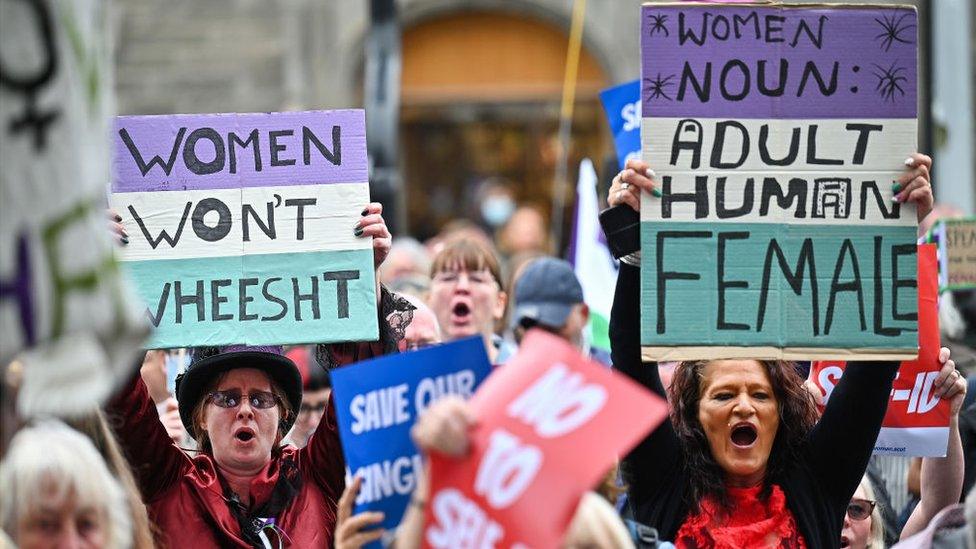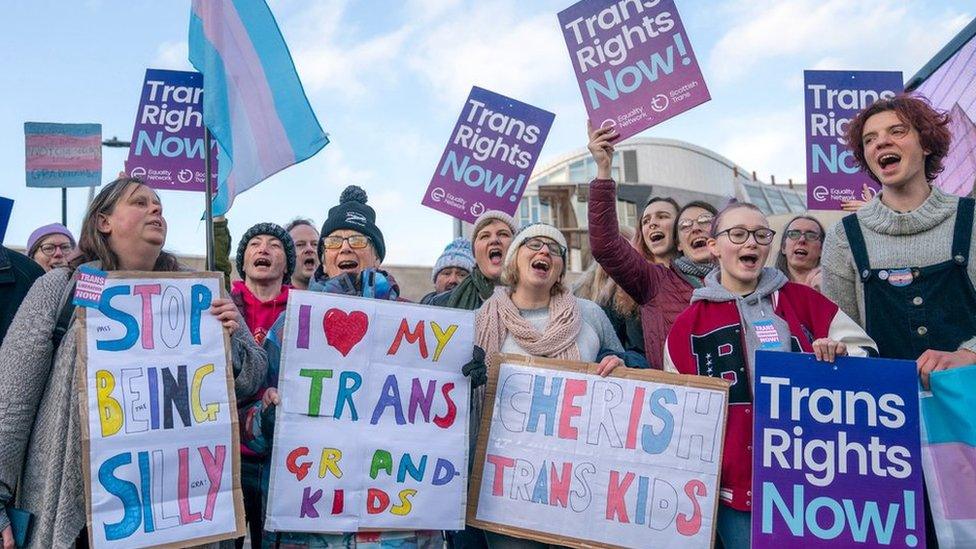Campaigners lose definition of 'woman' appeal bid
- Published

Campaigners have held rallies outside the Scottish Parliament
A campaign group has lost its appeal against a legal judgement relating to gender balance on public boards.
The Court of Session has ruled trans women with a gender recognition certificate do count when ensuring females take up half the posts.
For Women Scotland had argued the guidance was wrong because it undermined the definitions set out in the Equality Act 2010.
But three judges have concluded that it is lawful.
For Women Scotland said it was now considering its next move.
The legislation to ensure gender balance on public sector boards originally stated that the quota should include people who were living as a woman and who had either gone through, or intended to go through, the gender recognition process.
In December last year Judge Lady Haldane ruled that it was lawful for the Scottish government to proceed with plans to amend the 2018 Gender Representation on Public Boards Act. , external
She concluded the definition of sex was "not limited to biological or birth sex".
This prompted For Women Scotland to go to the Court of Session to argue that the proposal was unlawful.
The group previously won another legal battle against the Scottish government's plan to redefine "woman" in the legislation.
Judges at the Court of Session said that Holyrood's original legislation did breach the Equality Act.

The case was heard at the Court of Session in Edinburgh
The government's proposed remedy was published as statutory guidance in April 2022.
Its solution was that if a trans person has been issued with a full gender recognition certificate, stating that their acquired gender is female, then their sex is defined as a woman.
For Women Scotland's advocate Aidan O'Neill KC said this was still unlawful and breached the terms of the Equality Act.
He said that the act stated a "woman" is a person who is born female whilst a man is somebody who is born male.
But Lady Haldane rejected the argument made by Mr O'Neill and concluded that people with a gender recognition certificate could be classed as being part of their chosen gender.
Last month lawyers for the feminist campaigners challenged the ruling in the Inner House of the Court of Session.
Mr O'Neill told appeal judges Lady Dorrian, Lord Malcolm and Lord Pentland that their colleague had made errors in her judgement.
He argued that Lady Haldane's findings "conflated" two separate protected characteristics under the Equality Act - biological sex and gender recognition.
'Hugely disappointed'
However, in a written judgement published by the court on Wednesday, external, Lady Dorrian and her colleagues rejected Mr O'Neill's submissions.
Lady Dorrian wrote: "In our view it is clear that the intention was that on receipt of a Gender Recognition Certificate, a person's sex was to be that of their acquired gender, man or woman.
"The provisions of the Gender Recognition Act and the Equality Act may in our view be interpreted consistently for the purposes of both statutes without defeating the terms of either.
"We do not accept the submissions of the reclaimer that this somehow turns the provisions on their head, or diminishes the protection available to individuals against discrimination on the grounds of sex."
In a statement For Women Scotland said: "Naturally, we are hugely disappointed in today's judgment, which has ruled that women's protections under law may - in some cases - include men who have obtained a GRC.
"We are obviously still analysing the decision and will be speaking to our legal team in due course to consider the possibility of a further challenge."
- Published4 October 2023

- Published8 December 2023
